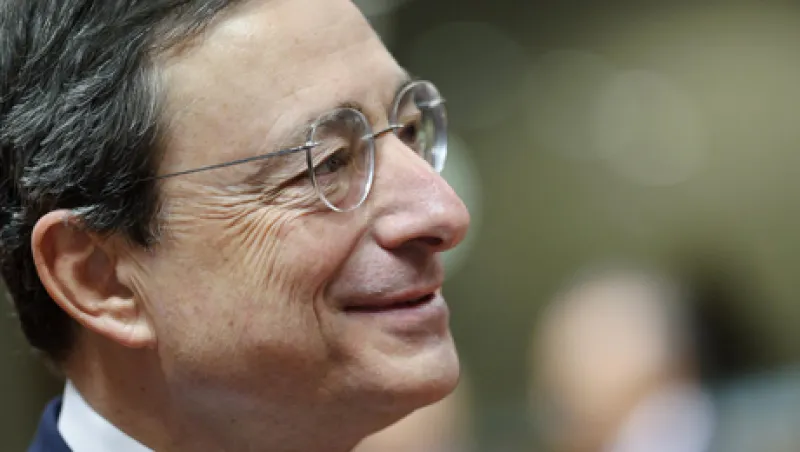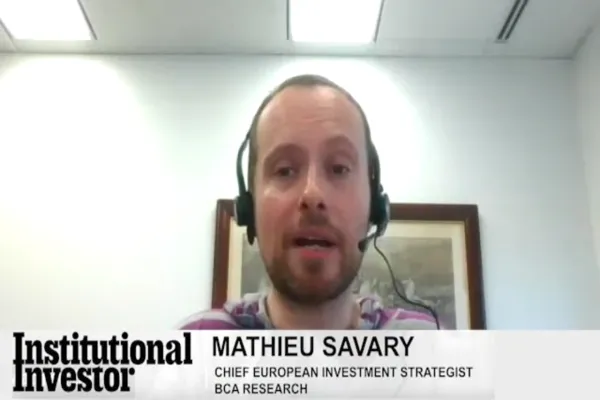Investors in euro zone debt markets basked in a rare moment of sunshine on Thursday as hopes grew that the European Central Bank (ECB) would offer succour to the 17-member bloc’s crisis-ridden economy by cutting its benchmark interest rate next week.
The heady air of optimistic expectation helped pushed down yields on government bonds—which have leapt towards the sky over the past few weeks across the eurozone. Yields on Italian 10-year bonds closed below the 7 percent mark—the danger zone after which analysts say yields risk escalating rapidly out of control—for the first time this week.
Traders in the euro zone sovereign market, which is worth several trillion euros, had eagerly awaited Thursday’s comments to the European parliament in Brussels by Mario Draghi, the new head of the European Central Bank.
Analysts had feared hawkish hints about inflation from Draghi, following Wednesday’s surprise news that euro zone inflation remained stubbornly stuck at 3 percent in November—1 percentage point above the upper limit of the ECB’s target. However, Draghi chose to emphasize that the ECB’s role was to maintain “price stability in both directions.” His comment was taken by investors as dovish on interest rates, since it suggested the ECB is as concerned about the possibility of deflation as it is about inflation.
Draghi also told the European parliament that “downside risks to the economic outlook have increased.” Lower economic growth makes it easier for central banks to cut interest rates since it reins in inflation.
His remarks boosted expectations among economists of a 25 basis point cut in the ECB’s main interest rate next Thursday to 1 percent, with some believing that even a 50bp cut to 0.75 percent is possible.
If rates are reduced again next week, this will be the second straight month of monetary easing by the ECB. Draghi presided over a 25bp trimming of rates at the beginning of November, in only his third day as ECB president.
Growing expectations of rate cuts further increased the value of euro zone bonds on Thursday, since lower interest rates tend to boost economic growth and therefore the tax revenue needed to pay for debt. These expectations also gave support to French and Spanish government bond auctions that were well-received by the market. Bond prices had already surged on Wednesday following the decision by the ECB and other central banks across the world to prevent a repeat of the 2008 money market paralysis that followed the collapse of Lehman, by cutting the short-term cost of borrowing dollars.
The yield on 10-year French government bonds dropped to 3.14 percent, down 25bp on the day and more than half a percentage point lower since the end of last week. The rate on Italian 10-years closed at 6.65 percent—tumbling 45bp on the day and 72bp since last week’s close.
However, few investors believe the ECB can avert a serious slump in the euro zone simply by cutting its benchmark interest rate. Most think the ECB can prevent an exceptionally severe recession only by agreeing to become the lender of last resort for the euro zone—buying up as much government debt as is necessary to push yields on Italian and other sovereign bonds down to the level where governments can afford to service the debt.
Schroders crystallized the current gloomy prognosis for the euro zone by announcing on Thursday that it had slashed its estimate for euro zone output from growth of 1.0 percent next year to a fall of 1.8 percent.
Jennifer McKeown, senior European economist at Capital Economics in London, predicted the ECB would cut its main rate to 1 percent next week. Ms McKeown added: “Crucially, however, the ECB will continue to resist calls for it to fire a silver bullet into the heart of the debt crisis by printing money to buy up huge quantities of highly indebted governments’ bonds.”
Draghi is unlikely to agree to print the money necessary to allow the ECB to buy government bonds in crisis-busting quantities without the collective say-so of euro zone governments. Angela Merkel, who as German chancellor is the most powerful politician in Europe, is unlikely to consent to this unless the European Union is given considerable powers to enforce budget discipline on member states with high fiscal deficits, such as France.
Nicolas Sarkozy, France’s president, signalled progress on this issue in a speech in Toulon on Thursday. He called for “common examination of our budgets” and “the establishment of the more rapid, the more automatic and the more severe sanctions” for countries which “do not respect their engagements”.
Euro zone member states will discuss future budget control at an EU summit in eight days’ time.






